Friendship 单元课件
文档属性
| 名称 | Friendship 单元课件 | 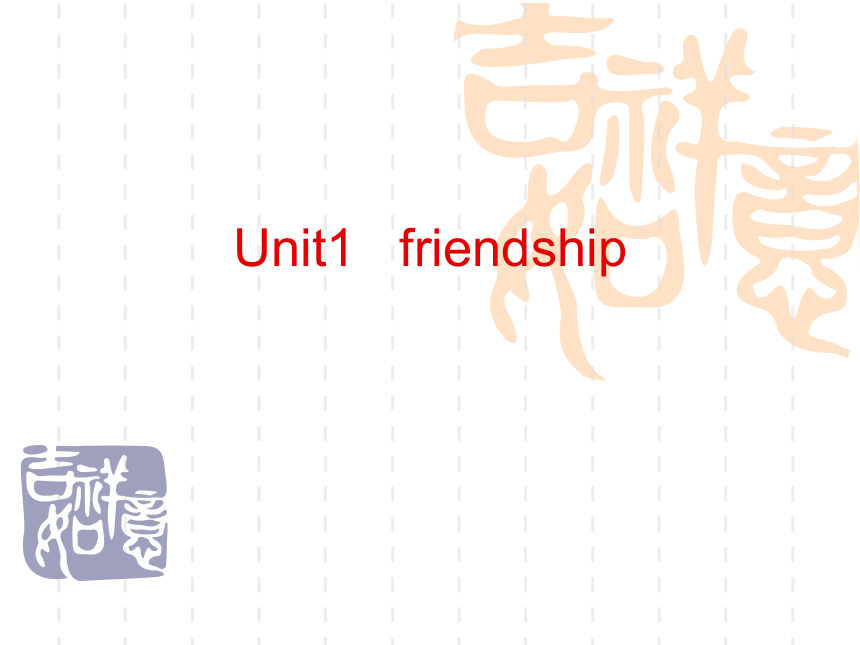 | |
| 格式 | rar | ||
| 文件大小 | 263.3KB | ||
| 资源类型 | 教案 | ||
| 版本资源 | 人教版(新课程标准) | ||
| 科目 | 英语 | ||
| 更新时间 | 2011-02-16 08:59:00 | ||
图片预览

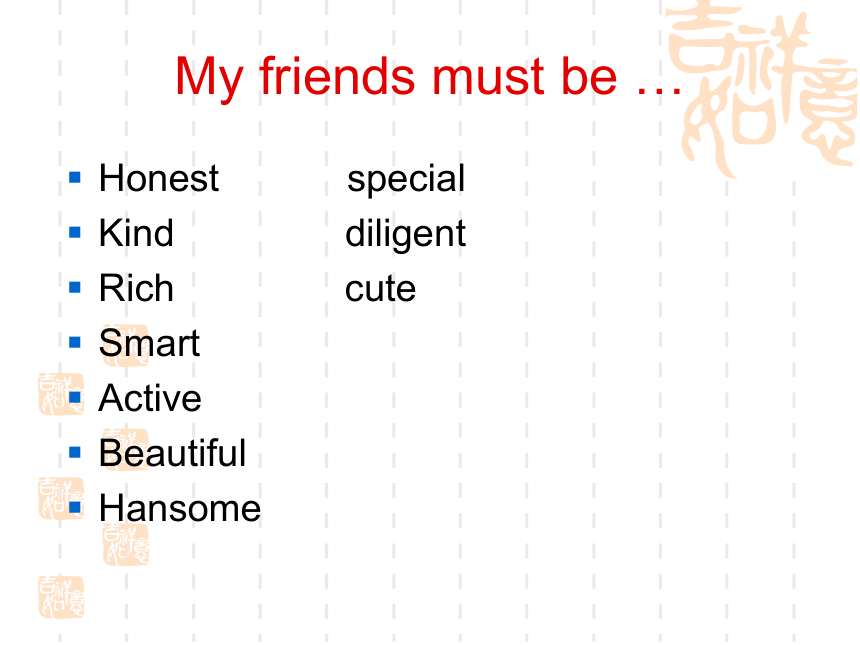
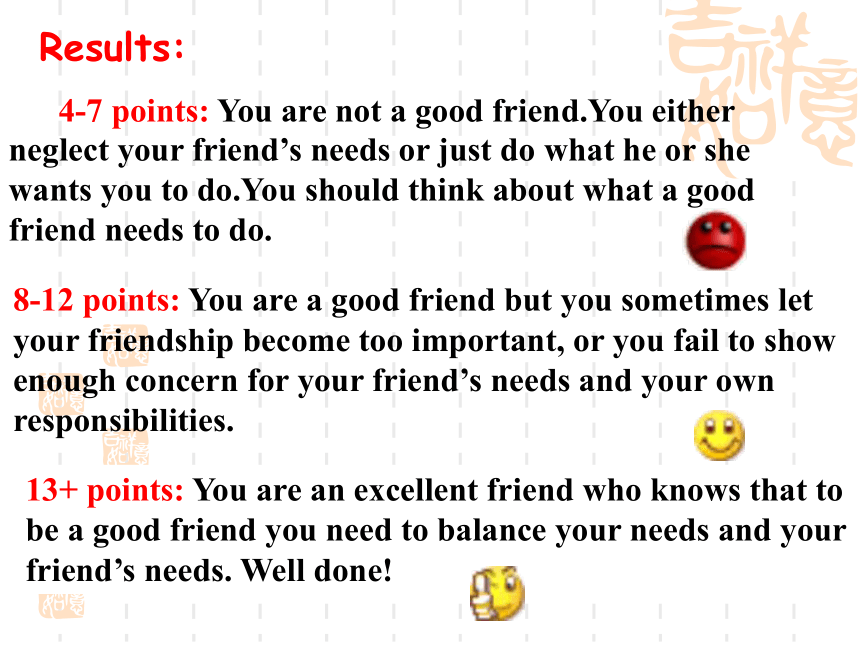
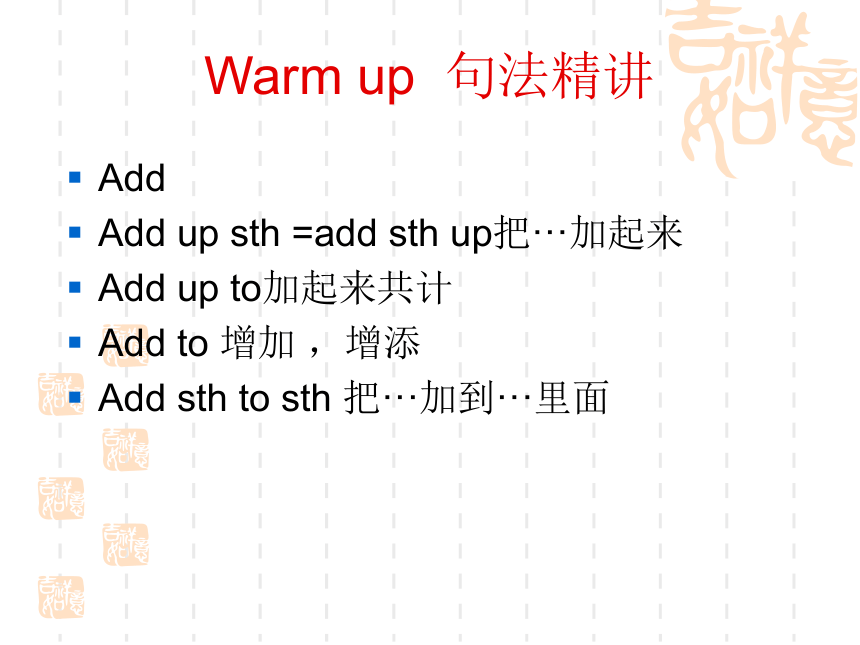
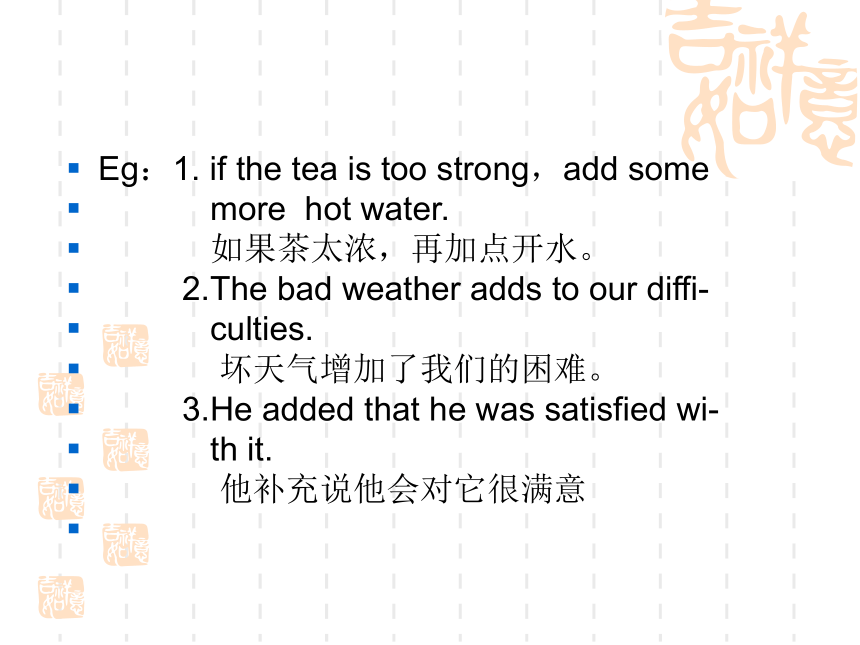
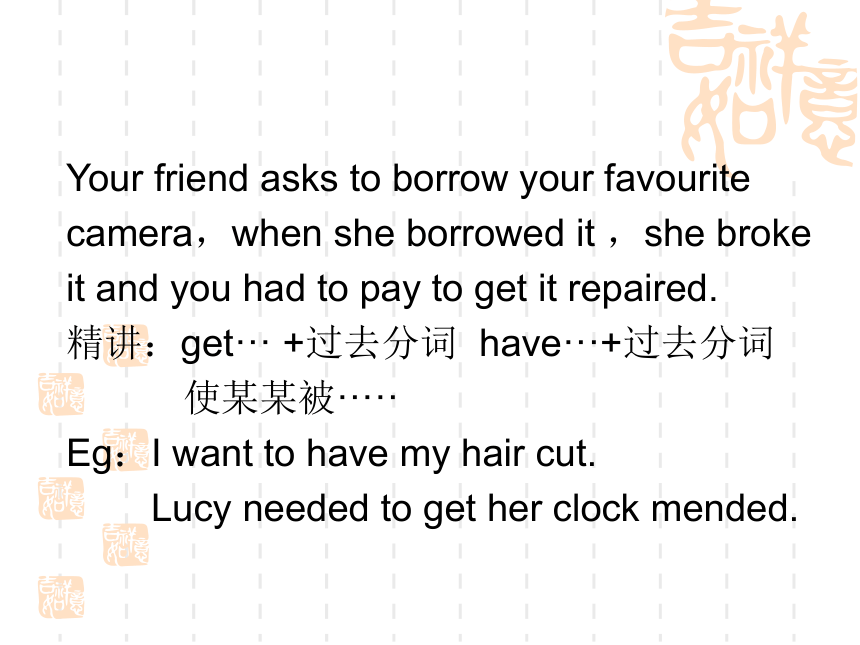
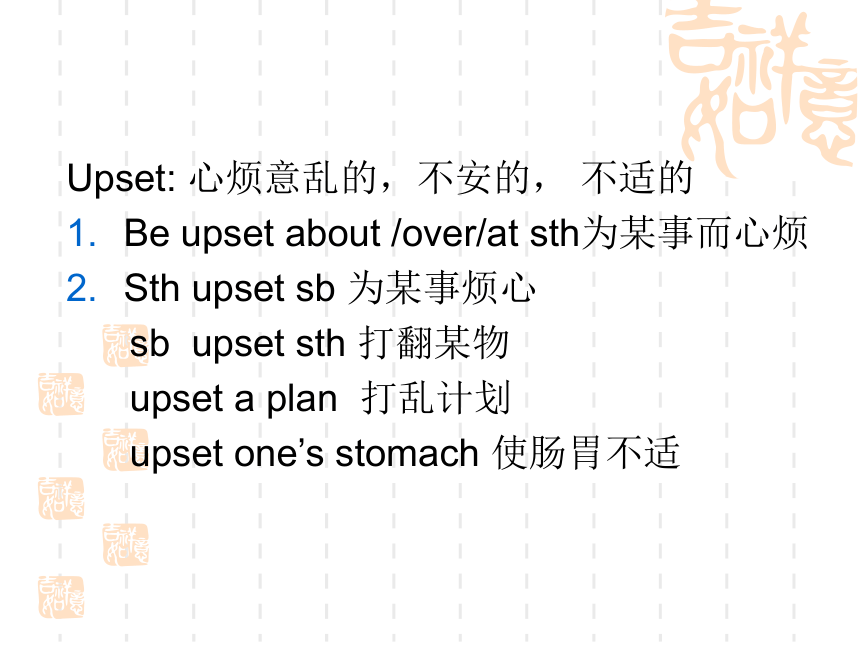
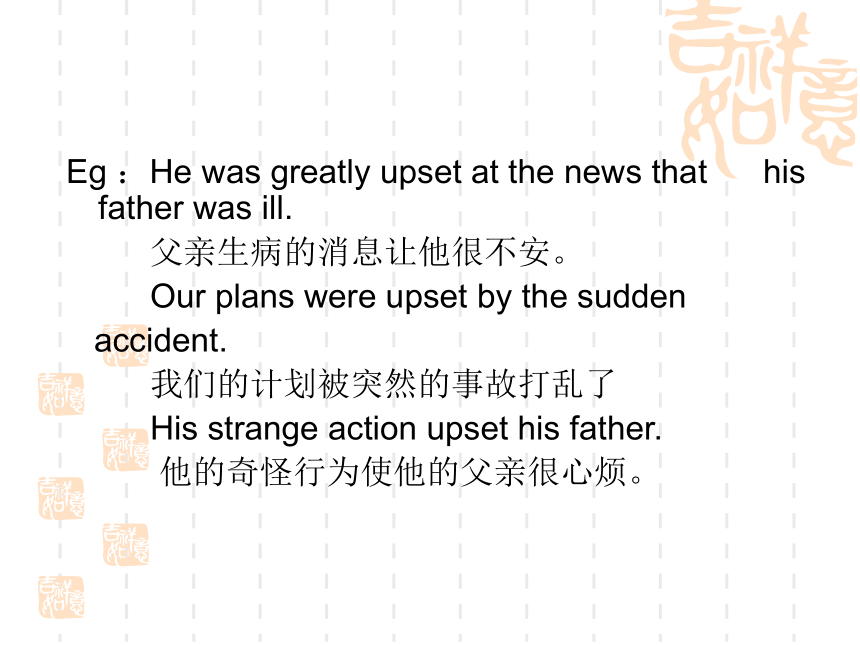
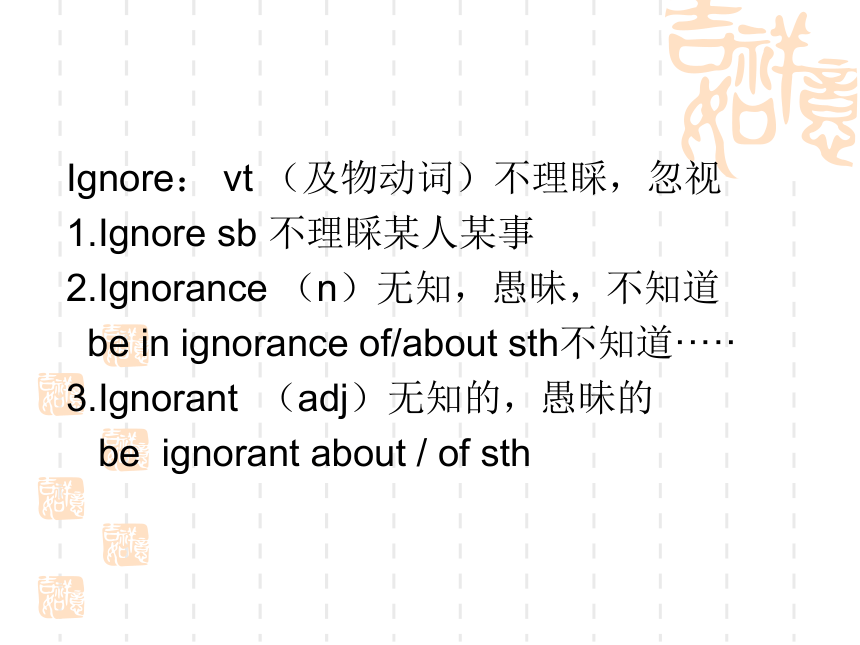
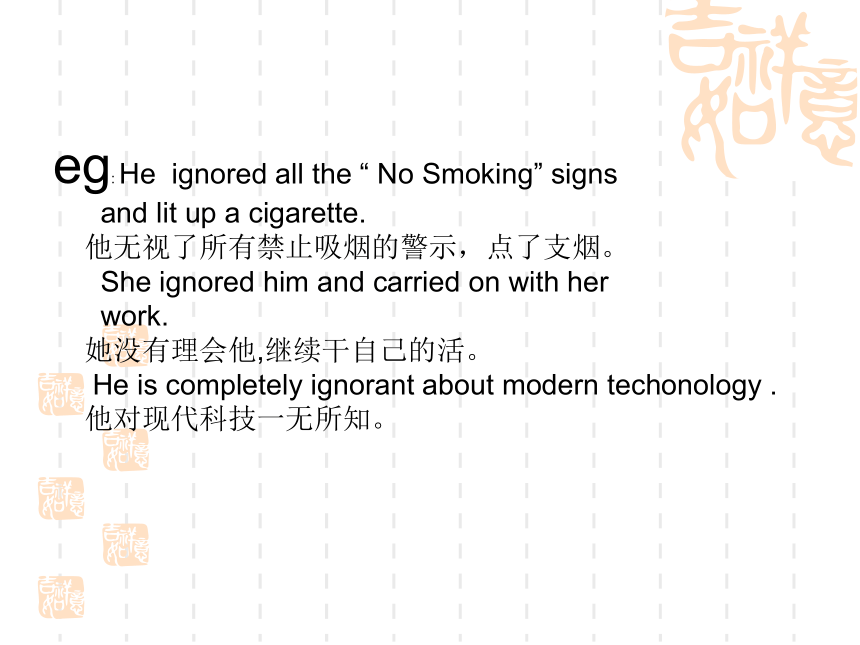
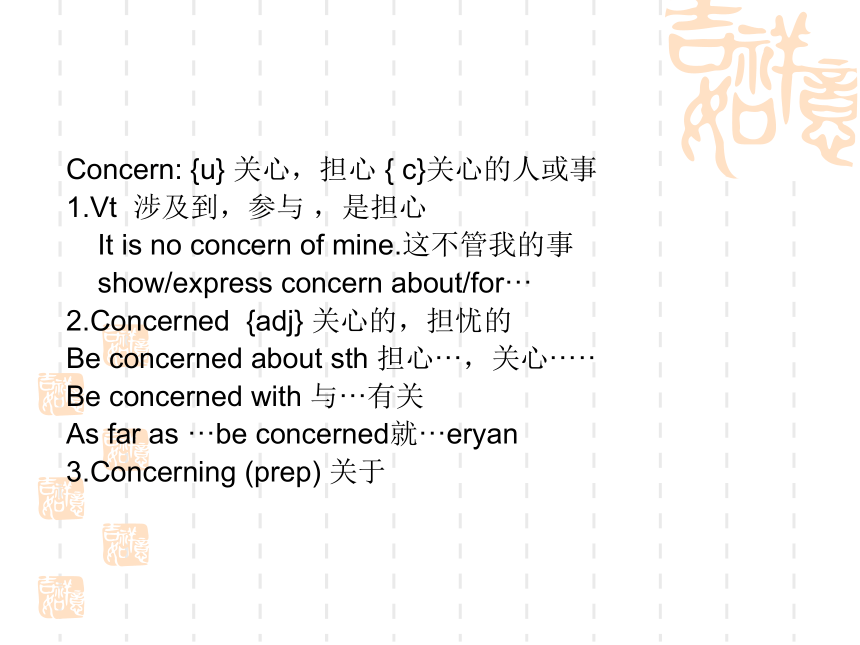
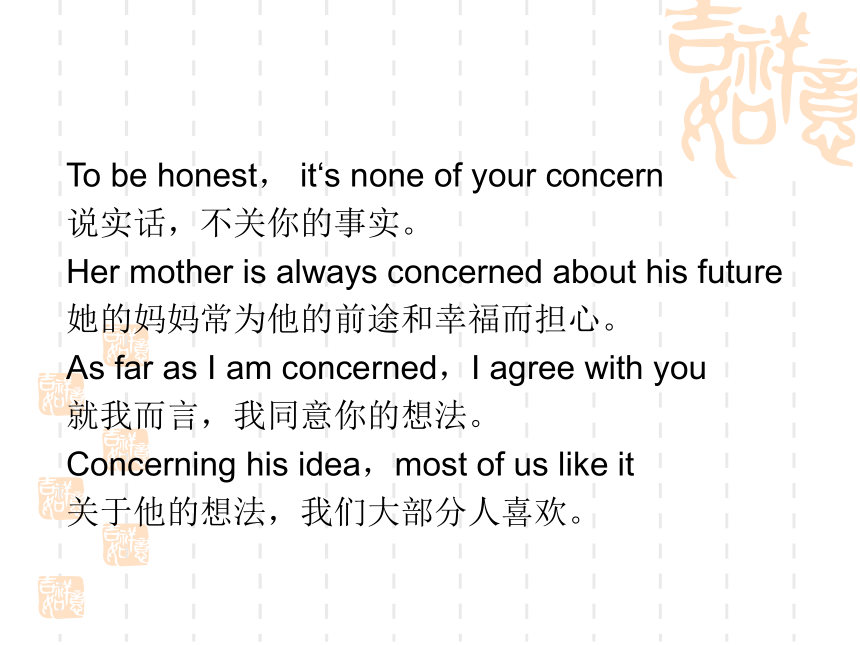
文档简介
课件60张PPT。Unit1 friendship My friends must be …Honest special
Kind diligent
Rich cute
Smart
Active
Beautiful
Hansome
13+ points: You are an excellent friend who knows that to be a good friend you need to balance your needs and your friend’s needs. Well done!8-12 points: You are a good friend but you sometimes let your friendship become too important, or you fail to show enough concern for your friend’s needs and your own responsibilities. 4-7 points: You are not a good friend.You either neglect your friend’s needs or just do what he or she wants you to do.You should think about what a good friend needs to do. Results:Warm up 句法精讲Add
Add up sth =add sth up把···加起来
Add up to加起来共计
Add to 增加 ,增添
Add sth to sth 把···加到···里面Eg:1. if the tea is too strong,add some
more hot water.
如果茶太浓,再加点开水。
2.The bad weather adds to our diffi-
culties.
坏天气增加了我们的困难。
3.He added that he was satisfied wi-
th it.
他补充说他会对它很满意
Your friend asks to borrow your favourite
camera,when she borrowed it ,she broke
it and you had to pay to get it repaired.
精讲:get··· +过去分词 have···+过去分词
使某某被·····
Eg:I want to have my hair cut.
Lucy needed to get her clock mended.
Upset: 心烦意乱的,不安的, 不适的
Be upset about /over/at sth为某事而心烦
Sth upset sb 为某事烦心
sb upset sth 打翻某物
upset a plan 打乱计划
upset one’s stomach 使肠胃不适
Eg :He was greatly upset at the news that his father was ill.
父亲生病的消息让他很不安。
Our plans were upset by the sudden
accident.
我们的计划被突然的事故打乱了
His strange action upset his father.
他的奇怪行为使他的父亲很心烦。
Ignore: vt (及物动词)不理睬,忽视
1.Ignore sb 不理睬某人某事
2.Ignorance (n)无知,愚昧,不知道
be in ignorance of/about sth不知道·····
3.Ignorant (adj)无知的,愚昧的
be ignorant about / of sth
eg: He ignored all the “ No Smoking” signs
and lit up a cigarette.
他无视了所有禁止吸烟的警示,点了支烟。
She ignored him and carried on with her
work.
她没有理会他,继续干自己的活。
He is completely ignorant about modern techonology .
他对现代科技一无所知。
Concern: {u} 关心,担心 { c}关心的人或事
1.Vt 涉及到,参与 ,是担心
It is no concern of mine.这不管我的事
show/express concern about/for···
2.Concerned {adj} 关心的,担忧的
Be concerned about sth 担心···,关心·····
Be concerned with 与···有关
As far as ···be concerned就···eryan
3.Concerning (prep) 关于
To be honest, it‘s none of your concern
说实话,不关你的事实。
Her mother is always concerned about his future
她的妈妈常为他的前途和幸福而担心。
As far as I am concerned,I agree with you
就我而言,我同意你的想法。
Concerning his idea,most of us like it
关于他的想法,我们大部分人喜欢。
Reading ANN’S BEST FRIENDBorn on June 12, 1929, she was a German-Jewish teenager who was forced
to go into hiding during the
world war II
AnneAnne’s diaryBackgroundThe Nazi Party ruled Germany from 1933 to 1945. One of their key policies was to kill all the Jews in Europe. To avoid this terrible fate, some Jewish families went into hiding, often with the help of non-Jewish friends. This diary was written during the time when Anne and her family moved to escape from being killed by Nazis.Skimming 快速阅读Who is Ann’best friend?
What is Ann’best friend called?
How long did Ann’family hide away?重点讲解Go through:
经历 ,经受,仔细检查,完成,用完
The poor girl has gone through such a lot
since her parents died.
Dave went through his pockets looking for
his key.
I went through my students’ homework yesterday.While walking the dog,you were carelessand
it got loose and was hit by a car.
While walking along the street ,I happened
to meet one of my friends.
在大街上散步时,我碰巧遇到了一位老朋友。
You wereI wasIf kissed by the princess,you will become an ice-man.
If kept by her mother, the vase wouldn’t be
broken.
While______his homework,he was bored.
You are、It was doingI stayed awake on purpose until half past
eleven in order to have a good look at the
moon by myself.
in order to do sth =so as to do sth
In order not to do sth= so as not to do sth
It is / was …….that / who ………E.g. Jack broke a glass yesterday afternoon
at his uncle’s home.1) It was Jack that / who broke a glass yesterday afternoon at his uncle’s home.(强调主语)2) It was a glass that Jack broke yesterday afternoon at his uncle’s home.(强调宾语)3) It was yesterday afternoon that Jack broke a glass at his uncle’s home.(强调时间状语)4) It was at his uncle’s home that Jack broke a glass yesterday afternoon. (强调地点状语)
It /This is the first time that …(现在完成时)
It /That was the first time that …(过去完成时)There was a time when ….1 有一段时间我步行上学。2 这是我第一次来北京。3 那是他第二次上班迟到。There was a time when I went to school on foot.This is the first time that I have been in Beijing.It was the third time that the man had been late for work.stay awake
1.stay: 保持,表示待在一个地方或处在某种情况。
1). 他现在待在家里。
2). 一连三天都是好天气。
3). 商店一直开到八点。 He is staying in the house now. The weather stayed fine for three days. The shop stays open until 8 p.m.. 2. awake 醒着的
他睡着还是醒着?
Is he awake or asleep?awake 为表语形容词, 不做定语。类似词有:
afraid, alive, alone, asleep, etc.Before的用法1强调从句动作在主句之前
I must leave before my sister come back
2.it +be +时间段+before从句:·····之后才·····
It will be ten years before we can meet again
十年之后我们才会再见面
3.It +be的否定形式+long +before从句:不久就····
It was not long before we can meet again
重点句型1.While walking the dog ,you were careless and it got loose and was hit by a car .
2.She and her family hid away for nearly 25
months before they were discovered
3.I wonder if it is because I haven’t been able to be outdoors for so long that I have grown crazy
about everything to do with nature4. I stayed awake on purpose until half past elven in order to have a good look at the
moon by myself
5.The dark,rainy evening,the wind ,the thundering clouds held me entirely in their
powerLearning about lauguageSettle :vi(不及物动词)安家,定居,停留
Settle down :舒适的坐下,定居,平静下来
Settle in:习惯于,适应
Settle the problem: 解决问题
eg:when are you going to get married and
settle down?(安定下来)
Wait until the students settle down before you start the lesson.(静下来)
Settle : vt (及物动词)使定居,安排,解决
Let’s settle(安排) the date of the next meeting.
I settled her on the sofa ,and put a blanket over her .
Suffer:遭受,忍受,经历
1.Suffer pain/defeat/loss/hunger
Suffer from:受········折磨
2.sufferer:患病者,受苦者(n)
suffering:肉体上或者是精神上的痛苦(n)
Eg:这辆车在事故中严重受损。
The car suffered severe damage in the accident.
发生洪水地区的人们正忍饿挨冻。
The people in the flooded area are suffering from cold and hunger.
重点词组与重点句型总结Add up
Calm down
be concerned about
Go through
Set down
A series of
On purpose
In order to 合计
平静下来
关心 挂念
经历 经受
几下
一系列
故意的
为了At dusk
Face to face
Suffer from
Be tired of
Pack sth up
Get along with
Fall in love
Join in
在黄昏
面对面
遭受
对某某厌烦
将东西打包
与某某相处;进展
爱上
参加直接引语和间接引语(一) Direct Speech and Indirect Speech直接引语:直接引述别人的原话
Mr Black said,“I am busy.”
间接引语:用自己的话来转述别人的话
Mr Black said that he was busy.
Find the differencesHe said ,“I like it very much.”
He said that he liked it very much.
He said to me , “ I have left my book in my
room.”
He told me that he had left his book in his
room.”时态的变化间接引语直接引语She said that she would do it after class.She said, “I’ll do it after class.”一般将来时- 过去将来时He said that he had finished the homework before supper.He said, “I had finished my homework before supper.”过去完成时 不变He said that he had come to help me.He said, “I came to help you.”一般过去时- 过去完成时She said that she had not heard from him since May.She said, “I’ve not heard from him since May.”现在完成时- 过去完成时He said that he was using the knife.He said, “I’m using the knife.”现在进行时- 过去进行时He said that he was afraid he couldn't finish the work.He said, “I’m afraid I can’t finish the work.”一般现在时— 一般过去时列 句直接引语转换成间接引语时的时态变化 直接引语 间接引语
指示代词 时 间 状 语 地点状语 方向性动词 this, that, these those
now, then, today that day
this week that week yesterday the day before
last week the week before
four days ago four days before the day before two days before
tomorrow the next day
next month the next month
here there
come, go,bring take 、其他特殊变化3结论一直接引语是陈述句,变为间接引语时用连词that引导宾语从句.从句中的人称,时态,指示代词,时间状语,地点状语等相应变化.1. Jack said to me, “You look worried today.”
Jack told me that ___ worried ___. A. he looks…today B. you look…today C. we looked…that day D. I looked…that dayExercises2. We said to her, “They’re walking through the street now.”
We told her that ___ through the street ___. A. we were walking…then B. you are walking…now C .they were walking…then D. they walking…now 3. Mr Black said, “I have walked a long way this week.”
Mr Black said that __ a long way __. A. I had walked…last week B. he had walked…that week C. I walked…last week D. he has walked…this week4. The man thought, “I shall take it back tomorrow.”
The man thought that __ take it back ____. A. I shall…tomorrow B. I shall…the next day C. he should…tomorrow D. he would …the next day 3. Mr Black said, “I have walked a long way this week.”
Mr Black said that __ a long way __. A. I had walked…last week B. he had walked…that week C. I walked…last week D. he has walked…this week2.疑问句
直接引语如果是疑问句,变为间接引语时,要吧疑问句语序改为陈述语序。句末用句号,主语的人称、时态和状语等也要作相应地变化。
1)一般疑问句:直接引语如果是一般疑问句,变为间接引语时,要用连词whether或if引导。主句中的谓语动词是said时,要改为asked,没有间接宾语的,可以加一个间接宾语(me,him,her,us ect)。
(1)He said, “are you interested in English?”
He asked me if I was interested in English.
(2)He said, “Did you see him last night?”
He asked me whether I had seen him the night before。
2)特殊疑问句:直接引语如果是特殊疑问句,变为间接引语时,任用原来的疑问词引导。
“What can I do for you?”he asked me.
He asked me what he could do for me.结论二直接引语是疑问句,变间接引语时,要从疑问语序变为陈述语序。
直接引语是一般疑问句,变为间接引语时,用连词if或whether连接。
直接引语是特殊疑问句,变为间接引语时,仍用原来的疑问词作连词来引导。
一般疑问句:变为间接引语后,要用陈述语序(主语先写)
用if 或whether引导。时态等作相应变化。1 He asked , “Can you hear me?” He asked if/whether I could hear him.2 The teacher asked, “Have you read this book, Bob?” The teacher asked Bob if/whether he had read that book.3 She said to me, “Will you go there with me?” She asked me if/whether I would go there with her.4 She asked, “Did you see the film yesterday, Peter?” She asked Peter if/whether he had seen the film the day before.5 “Are you leaving today or tomorrow?” Joan asked Kate. Joan asked Kate if/whether she was leaving that day or the next day.特殊疑问句:变为间接引语后,仍用原来的疑问词引导,用陈述
语序。时态等作相应变化。1 When did they build this bridge?” She asked. She asked when they built that bridge.2 Robert asked Alice, “Where is my dictionary?” Robert asked Alice where his dictionary was.3 Mrs. Bill asked him, “Which book do you like best?” Mrs. Bill asked him which book he liked best.1. They said to us, “Are you afraid to leave this house ?”
They asked us ____ afraid to leave _____ house. A. that were we…this B. that we were…that C. if were we …this D. if we were…that2. Jane said, “What did he hear about a week ago?”
Jane asked ____ about _____. A. that he heard…a week ago B. what he had heard…the week before C. what he had herd… a week ago D. if he heard…the week ago3. She asked, “Whose house will he break into next time ?”
She asked whose house ____ break into _____. A. will he…next time B. would he…the next time C. he would…the next time D. he will…next time 4. Jack said to her, “Where do you spend your holidays?” Jack asked her where ____ holidays. A. she spent her B. you spend your C. she spend her D. you spent your5. Black asked me, “ Why haven’t you left here yet?”
Black asked me why ____ yet. A. I hadn’t left there B. I haven’t left here C. hadn’t I left there D. haven’t I left here 6. The teacher asked her, “|Does the sun rise in the east ?”
The teacher asked her ___ the sun ___ in the east. A. if…rise B. if…rises C. whether…rose D. whether did …rise5. 注意地点的变化在直接引语变为间接引语时需要注意的变化1.注意时态的变化2. 注意人称变化。3. 注意指示代词的变化4. 注意时间的变化6. 注意个别方向动词的变化特殊用法1当直接引语从句是客观真理时,从句的时态是不变的
Our teacher said to us,“The earth goes round the sun.”
Our teacher told us that the earth goes round the sun2.直接引语是过去时并且和具体时间连用是,时态不变
She said,“ I was born in 1955.”
She told to us that she was born in 1955.
3.当主句的谓语动词为现在时或将来时的情况下,从句时态不变
He says,“I am tired.’’
He says that he is tired.
He will say ,“ The boy was lazy
He will say that the boy was lazy
Write an email (电子邮件)Topic(主题):给小东的建议
1.认真阅读写作背景
2.分组讨论好的建议
3.列出写作大纲(非常重要)
4.弄清楚书信格式
5 重新检查1.写出文章的主题
2.根据主题列出2---3个论点,并进行说明
3.总结语1 ,Adding up all the numbers ,you will know
the result.
2, we tried to calm him down ,but he still shouted excitedly.
3,After living in the hospital for a long time ,Mary recovered from her illness.
4, After settling here, Li Ming got along well
with his neighbours.
5,If you don’t want to stay with me ,you can pack up and leave.
6, During the war, I suffered a lot of pain ,so I set down my experiences in my diary in
order to remember them when I grow old
Kind diligent
Rich cute
Smart
Active
Beautiful
Hansome
13+ points: You are an excellent friend who knows that to be a good friend you need to balance your needs and your friend’s needs. Well done!8-12 points: You are a good friend but you sometimes let your friendship become too important, or you fail to show enough concern for your friend’s needs and your own responsibilities. 4-7 points: You are not a good friend.You either neglect your friend’s needs or just do what he or she wants you to do.You should think about what a good friend needs to do. Results:Warm up 句法精讲Add
Add up sth =add sth up把···加起来
Add up to加起来共计
Add to 增加 ,增添
Add sth to sth 把···加到···里面Eg:1. if the tea is too strong,add some
more hot water.
如果茶太浓,再加点开水。
2.The bad weather adds to our diffi-
culties.
坏天气增加了我们的困难。
3.He added that he was satisfied wi-
th it.
他补充说他会对它很满意
Your friend asks to borrow your favourite
camera,when she borrowed it ,she broke
it and you had to pay to get it repaired.
精讲:get··· +过去分词 have···+过去分词
使某某被·····
Eg:I want to have my hair cut.
Lucy needed to get her clock mended.
Upset: 心烦意乱的,不安的, 不适的
Be upset about /over/at sth为某事而心烦
Sth upset sb 为某事烦心
sb upset sth 打翻某物
upset a plan 打乱计划
upset one’s stomach 使肠胃不适
Eg :He was greatly upset at the news that his father was ill.
父亲生病的消息让他很不安。
Our plans were upset by the sudden
accident.
我们的计划被突然的事故打乱了
His strange action upset his father.
他的奇怪行为使他的父亲很心烦。
Ignore: vt (及物动词)不理睬,忽视
1.Ignore sb 不理睬某人某事
2.Ignorance (n)无知,愚昧,不知道
be in ignorance of/about sth不知道·····
3.Ignorant (adj)无知的,愚昧的
be ignorant about / of sth
eg: He ignored all the “ No Smoking” signs
and lit up a cigarette.
他无视了所有禁止吸烟的警示,点了支烟。
She ignored him and carried on with her
work.
她没有理会他,继续干自己的活。
He is completely ignorant about modern techonology .
他对现代科技一无所知。
Concern: {u} 关心,担心 { c}关心的人或事
1.Vt 涉及到,参与 ,是担心
It is no concern of mine.这不管我的事
show/express concern about/for···
2.Concerned {adj} 关心的,担忧的
Be concerned about sth 担心···,关心·····
Be concerned with 与···有关
As far as ···be concerned就···eryan
3.Concerning (prep) 关于
To be honest, it‘s none of your concern
说实话,不关你的事实。
Her mother is always concerned about his future
她的妈妈常为他的前途和幸福而担心。
As far as I am concerned,I agree with you
就我而言,我同意你的想法。
Concerning his idea,most of us like it
关于他的想法,我们大部分人喜欢。
Reading ANN’S BEST FRIENDBorn on June 12, 1929, she was a German-Jewish teenager who was forced
to go into hiding during the
world war II
AnneAnne’s diaryBackgroundThe Nazi Party ruled Germany from 1933 to 1945. One of their key policies was to kill all the Jews in Europe. To avoid this terrible fate, some Jewish families went into hiding, often with the help of non-Jewish friends. This diary was written during the time when Anne and her family moved to escape from being killed by Nazis.Skimming 快速阅读Who is Ann’best friend?
What is Ann’best friend called?
How long did Ann’family hide away?重点讲解Go through:
经历 ,经受,仔细检查,完成,用完
The poor girl has gone through such a lot
since her parents died.
Dave went through his pockets looking for
his key.
I went through my students’ homework yesterday.While walking the dog,you were carelessand
it got loose and was hit by a car.
While walking along the street ,I happened
to meet one of my friends.
在大街上散步时,我碰巧遇到了一位老朋友。
You wereI wasIf kissed by the princess,you will become an ice-man.
If kept by her mother, the vase wouldn’t be
broken.
While______his homework,he was bored.
You are、It was doingI stayed awake on purpose until half past
eleven in order to have a good look at the
moon by myself.
in order to do sth =so as to do sth
In order not to do sth= so as not to do sth
It is / was …….that / who ………E.g. Jack broke a glass yesterday afternoon
at his uncle’s home.1) It was Jack that / who broke a glass yesterday afternoon at his uncle’s home.(强调主语)2) It was a glass that Jack broke yesterday afternoon at his uncle’s home.(强调宾语)3) It was yesterday afternoon that Jack broke a glass at his uncle’s home.(强调时间状语)4) It was at his uncle’s home that Jack broke a glass yesterday afternoon. (强调地点状语)
It /This is the first time that …(现在完成时)
It /That was the first time that …(过去完成时)There was a time when ….1 有一段时间我步行上学。2 这是我第一次来北京。3 那是他第二次上班迟到。There was a time when I went to school on foot.This is the first time that I have been in Beijing.It was the third time that the man had been late for work.stay awake
1.stay: 保持,表示待在一个地方或处在某种情况。
1). 他现在待在家里。
2). 一连三天都是好天气。
3). 商店一直开到八点。 He is staying in the house now. The weather stayed fine for three days. The shop stays open until 8 p.m.. 2. awake 醒着的
他睡着还是醒着?
Is he awake or asleep?awake 为表语形容词, 不做定语。类似词有:
afraid, alive, alone, asleep, etc.Before的用法1强调从句动作在主句之前
I must leave before my sister come back
2.it +be +时间段+before从句:·····之后才·····
It will be ten years before we can meet again
十年之后我们才会再见面
3.It +be的否定形式+long +before从句:不久就····
It was not long before we can meet again
重点句型1.While walking the dog ,you were careless and it got loose and was hit by a car .
2.She and her family hid away for nearly 25
months before they were discovered
3.I wonder if it is because I haven’t been able to be outdoors for so long that I have grown crazy
about everything to do with nature4. I stayed awake on purpose until half past elven in order to have a good look at the
moon by myself
5.The dark,rainy evening,the wind ,the thundering clouds held me entirely in their
powerLearning about lauguageSettle :vi(不及物动词)安家,定居,停留
Settle down :舒适的坐下,定居,平静下来
Settle in:习惯于,适应
Settle the problem: 解决问题
eg:when are you going to get married and
settle down?(安定下来)
Wait until the students settle down before you start the lesson.(静下来)
Settle : vt (及物动词)使定居,安排,解决
Let’s settle(安排) the date of the next meeting.
I settled her on the sofa ,and put a blanket over her .
Suffer:遭受,忍受,经历
1.Suffer pain/defeat/loss/hunger
Suffer from:受········折磨
2.sufferer:患病者,受苦者(n)
suffering:肉体上或者是精神上的痛苦(n)
Eg:这辆车在事故中严重受损。
The car suffered severe damage in the accident.
发生洪水地区的人们正忍饿挨冻。
The people in the flooded area are suffering from cold and hunger.
重点词组与重点句型总结Add up
Calm down
be concerned about
Go through
Set down
A series of
On purpose
In order to 合计
平静下来
关心 挂念
经历 经受
几下
一系列
故意的
为了At dusk
Face to face
Suffer from
Be tired of
Pack sth up
Get along with
Fall in love
Join in
在黄昏
面对面
遭受
对某某厌烦
将东西打包
与某某相处;进展
爱上
参加直接引语和间接引语(一) Direct Speech and Indirect Speech直接引语:直接引述别人的原话
Mr Black said,“I am busy.”
间接引语:用自己的话来转述别人的话
Mr Black said that he was busy.
Find the differencesHe said ,“I like it very much.”
He said that he liked it very much.
He said to me , “ I have left my book in my
room.”
He told me that he had left his book in his
room.”时态的变化间接引语直接引语She said that she would do it after class.She said, “I’ll do it after class.”一般将来时- 过去将来时He said that he had finished the homework before supper.He said, “I had finished my homework before supper.”过去完成时 不变He said that he had come to help me.He said, “I came to help you.”一般过去时- 过去完成时She said that she had not heard from him since May.She said, “I’ve not heard from him since May.”现在完成时- 过去完成时He said that he was using the knife.He said, “I’m using the knife.”现在进行时- 过去进行时He said that he was afraid he couldn't finish the work.He said, “I’m afraid I can’t finish the work.”一般现在时— 一般过去时列 句直接引语转换成间接引语时的时态变化 直接引语 间接引语
指示代词 时 间 状 语 地点状语 方向性动词 this, that, these those
now, then, today that day
this week that week yesterday the day before
last week the week before
four days ago four days before the day before two days before
tomorrow the next day
next month the next month
here there
come, go,bring take 、其他特殊变化3结论一直接引语是陈述句,变为间接引语时用连词that引导宾语从句.从句中的人称,时态,指示代词,时间状语,地点状语等相应变化.1. Jack said to me, “You look worried today.”
Jack told me that ___ worried ___. A. he looks…today B. you look…today C. we looked…that day D. I looked…that dayExercises2. We said to her, “They’re walking through the street now.”
We told her that ___ through the street ___. A. we were walking…then B. you are walking…now C .they were walking…then D. they walking…now 3. Mr Black said, “I have walked a long way this week.”
Mr Black said that __ a long way __. A. I had walked…last week B. he had walked…that week C. I walked…last week D. he has walked…this week4. The man thought, “I shall take it back tomorrow.”
The man thought that __ take it back ____. A. I shall…tomorrow B. I shall…the next day C. he should…tomorrow D. he would …the next day 3. Mr Black said, “I have walked a long way this week.”
Mr Black said that __ a long way __. A. I had walked…last week B. he had walked…that week C. I walked…last week D. he has walked…this week2.疑问句
直接引语如果是疑问句,变为间接引语时,要吧疑问句语序改为陈述语序。句末用句号,主语的人称、时态和状语等也要作相应地变化。
1)一般疑问句:直接引语如果是一般疑问句,变为间接引语时,要用连词whether或if引导。主句中的谓语动词是said时,要改为asked,没有间接宾语的,可以加一个间接宾语(me,him,her,us ect)。
(1)He said, “are you interested in English?”
He asked me if I was interested in English.
(2)He said, “Did you see him last night?”
He asked me whether I had seen him the night before。
2)特殊疑问句:直接引语如果是特殊疑问句,变为间接引语时,任用原来的疑问词引导。
“What can I do for you?”he asked me.
He asked me what he could do for me.结论二直接引语是疑问句,变间接引语时,要从疑问语序变为陈述语序。
直接引语是一般疑问句,变为间接引语时,用连词if或whether连接。
直接引语是特殊疑问句,变为间接引语时,仍用原来的疑问词作连词来引导。
一般疑问句:变为间接引语后,要用陈述语序(主语先写)
用if 或whether引导。时态等作相应变化。1 He asked , “Can you hear me?” He asked if/whether I could hear him.2 The teacher asked, “Have you read this book, Bob?” The teacher asked Bob if/whether he had read that book.3 She said to me, “Will you go there with me?” She asked me if/whether I would go there with her.4 She asked, “Did you see the film yesterday, Peter?” She asked Peter if/whether he had seen the film the day before.5 “Are you leaving today or tomorrow?” Joan asked Kate. Joan asked Kate if/whether she was leaving that day or the next day.特殊疑问句:变为间接引语后,仍用原来的疑问词引导,用陈述
语序。时态等作相应变化。1 When did they build this bridge?” She asked. She asked when they built that bridge.2 Robert asked Alice, “Where is my dictionary?” Robert asked Alice where his dictionary was.3 Mrs. Bill asked him, “Which book do you like best?” Mrs. Bill asked him which book he liked best.1. They said to us, “Are you afraid to leave this house ?”
They asked us ____ afraid to leave _____ house. A. that were we…this B. that we were…that C. if were we …this D. if we were…that2. Jane said, “What did he hear about a week ago?”
Jane asked ____ about _____. A. that he heard…a week ago B. what he had heard…the week before C. what he had herd… a week ago D. if he heard…the week ago3. She asked, “Whose house will he break into next time ?”
She asked whose house ____ break into _____. A. will he…next time B. would he…the next time C. he would…the next time D. he will…next time 4. Jack said to her, “Where do you spend your holidays?” Jack asked her where ____ holidays. A. she spent her B. you spend your C. she spend her D. you spent your5. Black asked me, “ Why haven’t you left here yet?”
Black asked me why ____ yet. A. I hadn’t left there B. I haven’t left here C. hadn’t I left there D. haven’t I left here 6. The teacher asked her, “|Does the sun rise in the east ?”
The teacher asked her ___ the sun ___ in the east. A. if…rise B. if…rises C. whether…rose D. whether did …rise5. 注意地点的变化在直接引语变为间接引语时需要注意的变化1.注意时态的变化2. 注意人称变化。3. 注意指示代词的变化4. 注意时间的变化6. 注意个别方向动词的变化特殊用法1当直接引语从句是客观真理时,从句的时态是不变的
Our teacher said to us,“The earth goes round the sun.”
Our teacher told us that the earth goes round the sun2.直接引语是过去时并且和具体时间连用是,时态不变
She said,“ I was born in 1955.”
She told to us that she was born in 1955.
3.当主句的谓语动词为现在时或将来时的情况下,从句时态不变
He says,“I am tired.’’
He says that he is tired.
He will say ,“ The boy was lazy
He will say that the boy was lazy
Write an email (电子邮件)Topic(主题):给小东的建议
1.认真阅读写作背景
2.分组讨论好的建议
3.列出写作大纲(非常重要)
4.弄清楚书信格式
5 重新检查1.写出文章的主题
2.根据主题列出2---3个论点,并进行说明
3.总结语1 ,Adding up all the numbers ,you will know
the result.
2, we tried to calm him down ,but he still shouted excitedly.
3,After living in the hospital for a long time ,Mary recovered from her illness.
4, After settling here, Li Ming got along well
with his neighbours.
5,If you don’t want to stay with me ,you can pack up and leave.
6, During the war, I suffered a lot of pain ,so I set down my experiences in my diary in
order to remember them when I grow old
